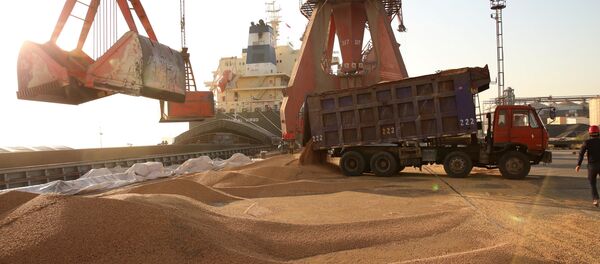China may be forced to resume purchases of US soybeans to meet domestic demand between October 2018 and March 2019 to fill in the void left by supply shortages from South America during that period, according to a recent report by Hamburg-based oilseeds analysts Oil World.
Due to the climate difference between the United States and soybeans suppliers in South America such as Brazil, Chinese traders typically start to purchase US soybeans from October each year, when soybean supplies from Brazil start to dry up after harvests during the summer are sold out. The climate difference worked perfectly for Chinese traders to meet domestic demand for soybeans, as South American soybeans can once again replace US soybeans next spring when new harvests become available.
READ MORE: US Soybean Business Warns Trump About Risks Posed by Trade War With China
However, the ongoing trade dispute between China and the United States showed no sign of de-escalation in recent months, after both countries slapped hefty tariffs to inflict pain on each other. As a key US export to China, soybeans from the United States will be subject to 25 percent import duties.
The steep tariffs on US soybeans have forced Chinese traders to scramble to find new sources of soybeans supply for the winter season when China usually relies on 15 million tonnes of imported US soybeans to meet domestic demand.
Customs Clearance Woes
"During a trade war, nobody [among Chinese traders] wants to step on landmines. Although Chinese authorities did not explicitly ban the import of US soybeans, the additional tariffs have been introduced. Even if the prices of US soybeans become cheaper than South American soybeans after adding 25 import duties, will Chinese traders start to import US soybeans again? They will face uncertainties in terms of unloading the crops and customs clearances after arrival at Chinese ports. The inspections from Chinese customs on US soybeans will definitely step up. Everyone [Chinese traders] will want to avoid such troubles," Monica Tu, a soybean market analyst at Shanghai-based agricultural consultancy JC Intelligence, told Sputnik.
READ MORE: US, EU Advance Trade Talks Amid Lingering Disagreements on Soybeans
The analyst added that it would be difficult for Chinese traders to import US soybeans through third countries because the place of origin for the crops is required to be clearly marked in international trade.
Domestic Supply
In anticipation of the trade dispute disrupting soybeans supply in China, Chinese authorities started to encourage farmers in the northeastern regions to plant more of this crop in May. But industry analysts pointed out that domestic soybeans production is unlikely to be sufficient to fill in the massive gap left by US soybeans.
"The impact from domestic soybeans production will be very minimal because China has never really relied on domestic production for soybeans. Annually, about 10 million tonnes of soybeans are produced in China, while imports can reach as high as 90 million tonnes. The figures are not even comparable," Fu Zhenzhen, a soybean market specialist at the Beijing Orient Agribusiness Consultant, told Sputnik.
To better prepare for the impact from the trade dispute with the United States, Chinese authorities have encouraged a reduction in domestic soybeans consumption, by cutting the use of soybean meal in animal feeds. But Fu argued that it is difficult for animal feed producers to find a suitable replacement.
"The Chinese government has called on manufacturers to reduce the use of soybean meal in animal feeds and encouraged them to add corn and other crops. But the supply of other crops is also very limited. The result could be a lower usage of protein-rich animal feed," she said.
Higher Prices in Winter
After new tariffs were introduced on US soybeans in early July, prices of soybean futures started to climb in commodity exchanges in China. Soybean prices in the country experienced their biggest daily gain in a decade on Wednesday, according to media reports.
READ MORE: China's Tariffs on E-Cars, Whiskey, Soya Designed to Penalize US 'Provocateur'
Rising pressure from the soybeans price hike could be transferred to consumer products such as meat, eggs, and dairy products during the winter season when consumption is expected to jump under colder weather conditions, Fu warned.
"By September, soybeans from Brazil will become scarce on the market, as we usually start to import US soybeans from October. We would be forced to import soybeans at higher prices by then, which would lead to price hikes in related products. If the animal feeds become more expensive, the prices for meat, eggs and dairy products will definitely go up in the fourth quarter, when consumption starts to peak as the weather gets colder. It’s always the ordinary people who will have to pay the prices [for the trade war]," she said.
Tu from JC Intelligence in Shanghai expressed hope that the trade tensions could ease in the two-three months before winter comes, which would help stabilize consumer products prices in China.
The views and opinions expressed in the article are those of the analysts and do not necessarily reflect those of Sputnik.





